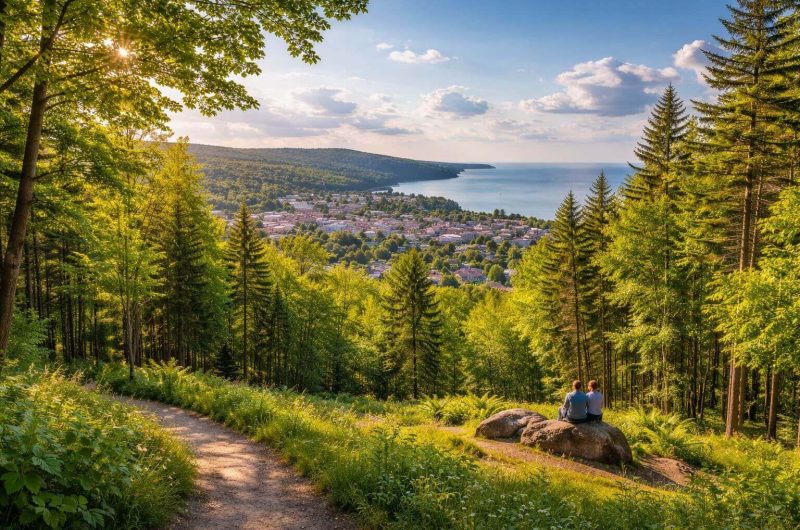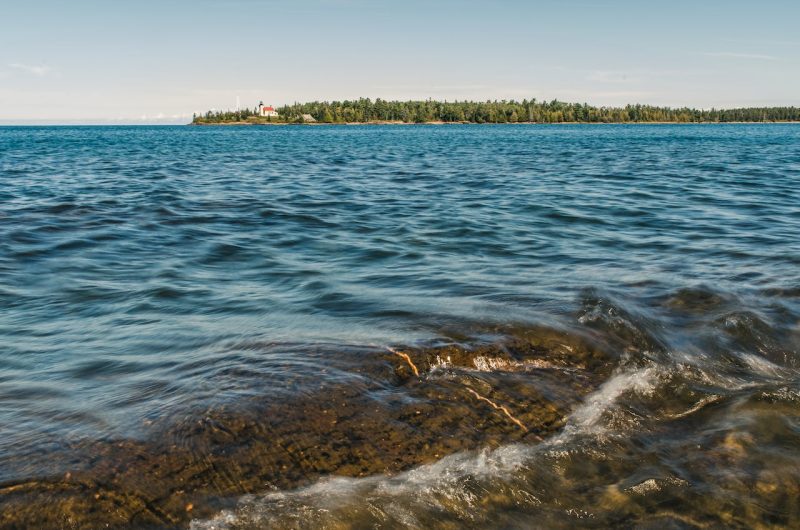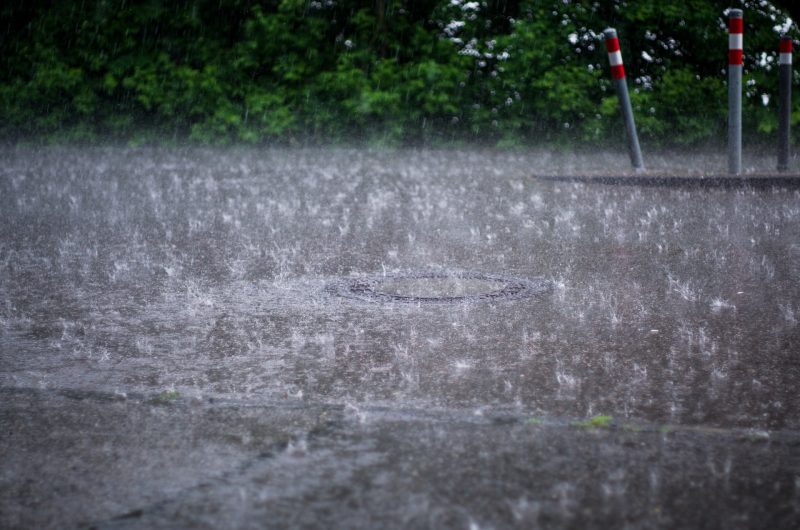Proceed With Caution

We are publishing the latest article by Katelyn Jasmin, a Research Assistant at the University of Michigan Ford School of Public Policy’s Center for Local, State, and Urban Policy (CLOSUP), in which she reflects on her changing perception of the world, from childhood innocence to the harsh reality of climate change.
This is the third article in a series from the “CLOSE UP on the UP” project, a collaboration between CLOSUP, U-M’s UP Scholars Program, and Rural Insights.
A team of undergraduate students from the UP who attend the University of Michigan are using CLOSUP survey data, with a particular emphasis on the responses from over 130 local governments in Michigan’s Upper Peninsula who respond each survey wave, to look at issues important to their home region and analyze the insights of the UP’s local government leaders.
Special note from CLOSUP:
If you are a UP county, city, village, or township official, please consider participating in the Spring 2024 wave of the Michigan Public Policy Survey (MPPS) from the University of Michigan’s Center for Local, State, and Urban Policy (CLOSUP). It’s important for the survey findings to include UP governments’ perspectives on questions about the challenges facing local communities across the state. This year’s survey is asking about public safety in your jurisdiction and law enforcement practices across the state. Please make sure your UP government’s voice is heard.
It’s the end of the world as we know it, and I don’t feel fine.
As a child, I saw the world as a place filled with pure happiness. It’s as though a bright, golden hue illuminated from everything I saw. I thought that no harm could fester in this paradise; everything and everyone was safe and always would be. I believe most children see the world this way, and it’s beautiful. Unfortunately, reality crushes that reverie as we grow older. For some, it’s a more intense and cruel reckoning than others. For me, the process was a gradual one as I grew up in a world seemingly crumbling to pieces as climate change progressively abused a society built on an unstable foundation.
Over the years, the world has seen what devastating impacts this environmental crisis can inflict upon society. A once distant problem is now a current nightmare. Climate change impacts– and will continue to impact– every aspect of human society and the environmental world. In these dire times, it’s important that all levels of government work to not only decrease carbon emissions but also prepare for the imminent impact.
Interestingly, the perceptions of climate change haven’t really changed among Michigan local officials in the last few years. Looking over time at statewide 2019 and 2023 surveys of Michigan local government leaders by the University of Michigan’s Center for Local, State, and Urban Policy (CLOSUP), the responses regarding the question on how serious a problem climate change is are almost identical (see Figure 1 below). This is unlike the noticeable change from the 2010 survey percentages on the same question, when just 18% viewed climate change as a very serious problem, compared with 28% today. The attitudes among U.P. local leaders align with those from the rest of the state. In 2023, 27% of U.P. local leaders say climate change is a serious problem, while 25% say it’s not too serious and, 19% say it is not a problem at all.
Figure 1: Michigan local officials’ assessments of climate change as a problem (Fall 2023 MPPS)
It’s a troubling situation. Over the last four years, there has been no increase in Michigan officials who believe climate change is a serious issue, and those that don’t believe it’s a serious issue have increased by around 3%.
This is concerning as the crisis is rapidly getting worse and for people to work to combat it, they need to believe it presents a danger. It’s also very intriguing to me, as an environmental studies student, how the majority of Michigan local officials haven’t shifted their perception on the seriousness of climate change given all the catastrophic climate events that have occurred in recent years. Since then, there have been: disastrous forest fires all around the world with the most notable ones being in Australia and Canada; rising sea levels; increased amount of heat waves that have claimed numerous lives; decreased agricultural efficiency; extreme loss of key ecosystems such as coral reefs; hundreds of species extinctions and endangerment; and that’s just scraping the surface.
Depressing, isn’t it?
My goal with this post, however, isn’t to spread fear about climate change and incapacitate people with the weight of the world’s suffering. I merely wish for Michiganders to be aware of how serious the situation is and inspired to take action. I am one who firmly believes that people need to understand the dangers that they face and how they can plan accordingly. As well as recognize the consequences of not doing so.
This is where the data from CLOSUP’s two surveys become very intriguing.
Both the survey from 2019 and 2023 asked Michigan local officials whether or not they thought various levels of government have some responsibility for dealing with climate change. Figure 2 below shows the results from both years. The kicker is that, in the four years between the surveys, more officials reported that the federal government has less responsibility in dealing with the crisis and that, in fact, local governments had more. Bet that wasn’t on anyone’s bingo card.
Figure 2: Michigan local officials’ assessments of whether different levels of government should address climate change (Fall 2023 MPPS)
Why is this the case? What could have happened during this time that changed these local official’s opinions?
Climate change is a global issue and some of the most impactful change will have to be enacted on the federal level because drastic action is needed in order to sufficiently reduce carbon emissions. The Biden Administration has made climate change and environmental policy one of its core focuses. Some of its most notable policies include re-entering the U.S. into the Paris Climate Agreement and the creation of the Inflation Reduction Act. The administration has enacted some more divisive policies, however, including its finalization on a suite of standards to reduce pollution from fossil fuel fired power plants. Suffice to say, it has taken a lot of decisive action over the last four years.
This has irked some people. Federal regulations and policy take precedence over those of state and local governments. Humans, in general, don’t like change a lot of the time– history has shown we have a very complex relationship with it– and this is particularly true when one feels like it’s interfering with their plans- such as policy plans of governmental officials. Thus, the changes brought on by the Biden Administration’s climate change policy are potentially not sitting well with some people. This could explain why a certain percentage of officials are starting to shift their desire for climate change responsibility toward lower levels of government.
A focus on local government responsibility is very relevant for the situation that the Upper Peninsula and the state of Michigan as a whole face. One of the consequences of climate change that doesn’t get as much attention is climate migration.
Climate change is making a lot of places uninhabitable and already millions of people have been displaced. Many people are now looking for regions that don’t feel the impacts of climate change as intensely even if the area they currently live in is still technically habitable. These people will migrate to what are called climate havens, which are places that are expected to avoid the worst impacts of climate change and will be able to develop infrastructure for growing populations.
Michigan is considered such a haven.

Lake of the Clouds | Photo Courtesy of Instagram Fan ktmulcahy
The U.P. is a prime location for climate migrants to settle; there’s a lot of opportunity for infrastructure development, it’s adjacent to a freshwater source, it’s expected to face fewer extreme impacts of climate change, and it has cleaner air and water than most urban cities.
There could be some problems with climate migration into the U.P., though.
I must make it clear that I am not saying that climate migration should not be accepted in the U.P. because of potential problems. I support climate migrants settling here, but I do feel that it is a situation that must be handled with care.
My first concern is relations between new settlers and locals. I love my home, I really do, but I’ve noticed growing up that many in the Yooper community have a sort of “no outsiders” sentiment. I’ve also noticed that some individuals possess racist mentalities (as is the case anywhere). As a result, climate migrants of color could face increased tensions. Of course, not all blame can be put on the locals. Some people have already migrated to the U.P. because of concerns of future climate change impacts, and community members’ experiences with them have been mixed. In that linked article, some residents describe individuals coming from urban environments as having a disrespectful attitude toward the local community, feeling that the new residents want to change it to be more like the urban lifestyle they’re used to, rather than appreciate the rural, slow-paced lifestyle the U.P. is known for. Of course, these experiences could be influenced from already existing tensions between rural and urban communities in Michigan.
It’s all about perspective.
Interactions will depend on the willingness from both groups to peacefully coexist and be open-minded. Nevertheless, it’s a point of concern.
The second and more material concern is that the U.P.’s infrastructure is ill-equipped to accommodate an influx of climate migrants. As a Yooper, I can say from direct experiences that the U.P. ‘s infrastructure can barely support its current population. Maybe not even that. For instance, housing is not in a good place; so much so that some businesses are securing housing for their employees because their employees are having such a hard time finding it on their own. Even if local jurisdictions decide to update their infrastructure, though, the critical question is how they do it.
The U.P. is known for its natural landscape and magnificent beauty; it’s the reason we get a lot of tourism during the summer season. That environment that we’ve come to love, though, could be threatened by a botched process of improving the U.P.’s infrastructure. If U.P. officials follow the historical precedent of expanding development into the surrounding environment, harming vital ecosystems in the process, then parts of our vast forests could be lost, or at the very least damaged. This would face enormous backlash from the community.

After Michigan’s logging era, much of the northern part of the state looked like a wasteland; National Archives/Wikimedia Commons
That course of action, from a basic environmental standpoint, would also be highly unwise as forests are a great source of carbon capture and removing them would increase the amount of carbon dioxide in the atmosphere, thereby increasing climate change further.
The U.P. is in a very interesting position right now. A place whose growth has been stifled by economic hardship, old viewpoints, and lack of recognition now has the chance to develop in new ways. The most fantastic part about this is that we have the opportunity to develop in a way that’s different from the historical approach: growing the community to be more connected to the outside world as well as harmonious with its environment. An opportunity to provide a sustainable future to future generations.
That is the core sentiment I hope many take from this piece: hope for a brighter future and determination to build it conscientiously and respectfully. It can feel like the world has gone insane at times, but perhaps it has always been this way and it’s our role as its inhabitants to try and make it better. That’s the philosophy I live by, at least.
Setting aside philosophy, it’s still plain to see that the storm of climate change isn’t just brewing any longer. It’s mercilessly striking all across the globe–some places more severely than others. However, the fact is that while places like the U.P. won’t feel the more extreme impacts of climate change, it will not be immune to them. With a global crisis like climate change, even the far-off U.P. won’t remain isolated for too long.
It’s crucial for every person to engage in the process of building the future of the U.P. On a much larger scale, it’s also important that every person helps to mitigate climate change in any way they can. That’s why the survey data on Michigan officials’ perceptions of the seriousness of climate change is worrisome. There’s a lot of heavy emotions connected to climate change and over the years, it’s become a source of contention, especially in politics. The polarization has become so extreme that debates on how to address climate change, and how serious it is, are more about dividing people into opposing factions with dogmatic opinions than actually finding a solution.
However, bold action is urgently needed in order to prevent disastrous outcomes for both the natural environment and human society. There absolutely cannot be people who have influence on policy that still don’t recognize climate change as a serious issue.
Now is the time to deeply contemplate what climate change means for the world and our lives instead of jumping to established conclusions. At the end of the day, one of the most powerful tools we have at our disposal is our ability to think conscientiously.
Be wise, for we are running out of time.








There are Lot’s of opinion here. The article is short on facts. Is there a reason to suggest Yooper’s are racist in an article on climate?
It was uncharacteristically windy today. In my opinion the wind turbines are wreaking havoc on the world wind patters. I guess for every action there really is an equal & opposite reaction.
I travel a 10,000 mile route that is totally rural and includes the entirety of the UP along with fifteen other states and two Canadian provinces. In my travels I speak with many people in the places I go. The only people that tell me about the concern about climate change are within two groups: educated adults who are worldly and farmers. The article is so correct in saying rural Northern America (yes, the UP is not its own small island it’s the entirety of rural Northern America and much of Canada that have very similar problems) needs to prepare itself for climate refugees. There are nearly zero modern apartment complexes and nearly zero condominium units in the entirety of rural Northern America. So, where are we going to house rural refugees? Same is true of infrastructure. Many if not most rural communities do not have good roads, sidewalks, safe drinking water, sewers, etc. So while local officials are in denial nothing at all will change. It’s one reason I left the UP and moved entirely to west Michigan which is growing and certainly more aware of climate change.
I am surprised, David, that you would publish an article so lacking in facts and so filled with innuendo and unsubstantiated opinion. “It’s the end of the world as we know it…” Come on. The article appears to have facts about people’s opinions about climate change, but even there the author provides no information on the sample size. I could go on, but why waste my time.
This is a very well written article that just touches on the challenges that we face. I am just one of those people who have moved to the UP because I view it as a safer place in this world of climate change. As the author states, and what several of the comments show people just don’t want to believe what is happening around us. It’s sad.
“ several of the comments show ”
Where exactly in the comments are you talking about?
84% of those in the survey respond that it is not a serious problem or not a problem at all. Not obvious to me that the (minimal) statistics prove any point the author may be trying to make.
If the point of the article was to educate or persuade then it missed the mark as it didn’t prove anything other than every is entitled to their opinion. Or is the point of this article to demonstrate that Rural Insights is willing to provide a voice to many opinions. Then great. Lets hear from all sides
The sad product of a failed educational system. All “feels” and histrionics, no facts.
I guess you can always get your loans forgiven.
Its been a year and a half since anything has been posted here really.
Like a lot of issues here in UP and environment nothing but empty lip service all the higher thinkers and politicians in the world….Empty talk and don’t give a damn attitudes.
I really find all talk and never any action or accountability just the same crock of manure thats existed here for generations.
So to all you Dr feel goods, malarchy.